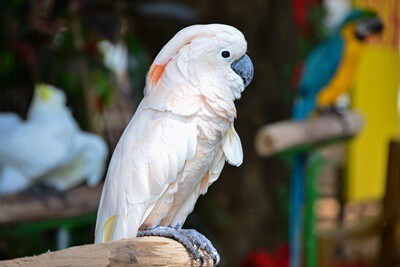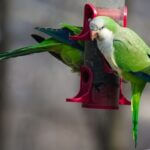Last Updated on January 28, 2024 by Carrie Stephens
Cockatoos aren’t expert talkers, but some birds can mimic human speech. Most copy the noises they hear (microwave beeps, doorbells, etc.) Some cockatoos learn up to 30 words, while others never talk.
Mimicry skills depend on the cockatoo species, the age at which they start learning, bonding, happiness, and personality. A bird without a same-species companion is likelier to develop speech abilities.
Birds that listen to the TV or radio may repeat some of the words people use. If a cockatoo likes the sound of a word or it invokes a human response, it’s likely to want to learn it.
Cockatoos often babble or produce sounds that are incomprehensible with little meaning. This happens when a cockatoo mimics a couple of people chatting to each other.
Many sulphur-crested cockatoos can become good talkers when consistently trained from a young age. Goffin, umbrella, red-tailed, Moluccan, and Major Michell’s cockatoos are less likely to speak.
How Cockatoos Learn To Talk
Training cockatoos to talk isn’t easy, but it may be achievable.
Cockatoos are a species that can mimic human words. Owners should use consistent training techniques to encourage their cockatoos to speak. To do so:
- Use simple words like “hello,” “bye,” and “night-night” in a happy, enthusiastic tone.
- Repeat words until the parrot starts to recognize them.
- Use additional training tools, including audio recorders and CDs.
- As soon as the cockatoo picks up words, add new ones to ensure it keeps learning.
Researchers found that parrots have “song system structures” that are key to mimicking words.
Cockatoos talk by modifying the air that flows over the syrinx, enabling them to produce sounds. They use vocalizations to gain acceptance by a flock, increasing their chances of survival.

Age Cockatoos Start Talking
There’s no set age for cockatoos to start talking. All parrots are different, and their intelligence levels vary, which applies to cockatoo species (Cacatuidae).
Most cockatoos start to talk around the 10-12 month mark once they mature. The factors that affect the age at which cockatoos start talking include:
- When you train the cockatoo to speak.
- The cockatoo’s personality.
- The gender, as males sometimes talk more than females.
- How willing a cockatoo is to talk.
The sooner you interact with a cockatoo, the more likely it is to pick up English words and phrases.
If you never speak to a cockatoo, it’ll never mimic you. Similarly, if you purchase an old or rescue center cockatoo that has established its personality and skills, it may never speak.
Cockatoos Don’t Understand Us
While some cockatoos mimic words, they don’t understand human speech. Cockatoos are likely to say words back to their owners because they recognize the sounds they make in context.
For example, owners who greet their cockatoos by saying “Hello” as they walk into the room are more likely to experience their parrot saying it back.
They understand the word’s meaning, but it shows that cockatoos recognize the conversation’s context.
Humans rush to appliances, like microwave ovens and doorbells, when they beep or ring. As a result, parrots treat the beeping sound like a human word.
The beep has no contextual meaning, but cockatoos know the sound draws the owner’s attention.
To give the cockatoo the best chance of interacting with you, nurture its talking abilities from a young age and engage in regular conversation to provide it with a contextual understanding.
Cockatoos Don’t Understand English
Cockatoos can’t distinguish between different human languages. For example, they can’t differentiate Spanish or Mandarin Chinese from English.
They may learn their owners’ languages, but only because they mimic the sounds they make.
This might surprise some owners because it often sounds like they can understand what you’re saying. However, our brains fill in the blanks, making it seem like cockatoos understand English.
That doesn’t mean you can’t have a fun conversation with the cockatoo. Their mimicry skills are so advanced that their sounds are often authentic replicas of our words.
The Best Talking Cockatoos
If you want a cockatoo that may be able to talk, the following are good choices:
Sulphur-Crested Cockatoos
Sulphur-crested cockatoos are the best-talking cockatoos.
They’re fast learners who can often pick up words and phrases with ongoing training. However, their speech may sound slightly slurred or incoherent when they speak.
They also learn sounds like a dog’s bark and power tools. This is common among all cockatoo species.
Sulphur-crested cockatoos are noisy birds, often producing ear-splitting contact calls. They have a loud contact call to communicate with their flock mates in the wild.
Galah Cockatoos
Galah cockatoos (rose-breasted cockatoos) are among the cleverest cockatoos. They’re not as quick at talking as sulphur-crested cockatoos, but they’re among the best cockatoo talkers.
While both genders are good at imitating people’s voices, males are better talkers than females. They can also imitate everyday sounds, like whistles, telephones, or appliance beeps.
Not only are galah cockatoos clever, but they enjoy doing things to entertain us. The greater the impact words and actions have on their owners, the more likely they’ll become ingrained behaviors.
Galah cockatoos make a high-pitched sound while flying. When threatened, they make a loud screech.
Umbrella Cockatoos
Umbrella cockatoos are friendly and like to interact with their owners. They aren’t the most talkative birds, preferring to scream and screech to communicate. However, they’re good at learning tricks.
Not all umbrella cockatoos learn to talk, and most don’t until they’re older.
Goffin Cockatoos
Depending on their personality, Goffin cockatoos can pick up a few words. Without training and socialization, they can be noisy.
As they’re so vocal, many owners assume they’ll talk without training, which isn’t true.
While Goffin cockatoos respond well to training, don’t be disheartened if the cockatoo doesn’t develop talking abilities because this is relatively normal.
Red-Tailed Cockatoos
Red-tailed cockatoos are another quiet cockatoo species with a calm personality.
Their natural calls consist of “craw” and “kree” sounds, which are comical and goofy. If a red-tailed cockatoo’s needs are met, it’ll remain peaceful.
Major Mitchell’s Cockatoos
Major Mitchell’s cockatoos are among the most distinctive and beautiful birds. Their gentle temperament and colorful plumage make them highly sought-after pets.
They’re quieter than other cockatoos. They’re not good talkers, but they can mimic basic words. However, they prefer to copy whistles and alarm sounds, which they find easier to imitate.
Moluccan Cockatoos
Moluccan cockatoos aren’t the best talkers but may learn some basic words that they tend to yell. They also screech and scream for attention more than they talk.
Other Sounds Cockatoos Make
Cockatoos vocalize to display their feelings and emotions. Sometimes, you’ll hear a cockatoo make these sounds rather than talking. These sounds include:
Whistling
Cockatoos make melodic whistling sounds. Many cockatoos may prefer to whistle than talk, causing them to lose the desire to mimic human speech.
Mimicking is the sound of a happy, relaxed cockatoo that feels safe. Some cockatoos whistle when bored and make this sound to get their owner’s attention.

Squawking and Screeching
Cockatoos make loud-pitched screeches. Most cockatoos screech and squawk regularly, especially in the morning, which is a natural part of their communication repertoire.
Umbrella, Moluccan, and Goffin’s cockatoos are more prone to doing this than other species.
Singing
If you frequently have the TV or radio on around the cockatoo, it’s likely to sing by copying the songs and sounds it hears. Singing is similar to talking and signifies that a cockatoo is happy and upbeat.
Scientific American describes how captive cockatoos can sing lower notes than smaller birds.
Hissing
When cockatoos hiss, it means that they’re feeling afraid or threatened. This is the final warning before biting, so be careful not to provoke them. Cockatoos also hiss due to:
- Intimidating cage mates or other pets.
- Unfamiliar objects in the cage.
- A dislike of being touched.
- A bad or antisocial mood.
- Pain or illness.
If a cockatoo hisses, give it space or address its concern.
Calling
Cockatoos call out to find flock mates. Their call is unique to the flock, meaning they can locate each other. In captivity, owners are flock members, so they call to them when unsure of their whereabouts.
Calling can indicate anxiety and loneliness, so reveal yourself to put the cockatoo at ease and give it some attention. Ignoring a cockatoo affects its mental health.
Cockatoos aren’t the most accomplished talking parrots, but some species can learn to repeat English words if given ongoing training. If a cockatoo never speaks, it’ll communicate with you in other ways.





